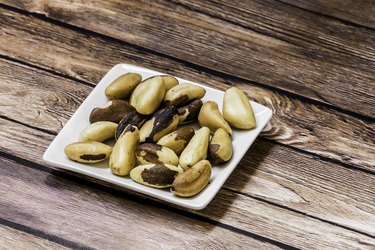
Selenium yeast is a form of supplemental selenium, which is also referred to as organic selenium. While it's safe for most people, selenium becomes toxic if the amount you consume exceeds the maximum safe intake. Selenium can also interact with some medications and medical conditions, so talk to your health care provider before taking supplements if you have health concerns.
Selenium Yeast Basics
Video of the Day
Selenium yeast is produced using the microorganism Saccharomyces cerevisiae, which is better known as baker's yeast or brewer's yeast. When the yeast is grown in a selenium-enriched medium, it absorbs the selenium and converts it into the form of selenium naturally found in foods, selenomethionine. The final product is used to fortify foods and to make supplements.
Video of the Day
Types of Supplements
Selenium supplements may contain three different forms of selenium: selenomethionine, selenite and selenate. Some brands simply mix yeast with selenite or selenate, notes the Linus Pauling Institute. If your brand is genuine selenium yeast, the label will report selenomethionine as an active ingredient.
Your body can metabolize and use all three forms of selenium, but the amount absorbed varies. About 90 percent of selenomethionine and 50 percent of selenite are absorbed, according to the Linus Pauling Institute. While selenate is almost completely absorbed, a large amount is excreted in urine before being used in your body.
Health Benefits
Your body depends on selenium to produce thyroid hormones and glutathione peroxidases, which are important antioxidants. If you have a selenium deficiency, taking selenium yeast ensures your body can continue to synthesize these essential substances.
Selenium supports the immune system by boosting the activity of white blood cells that fight infection and disease, according to a review in the scientific journal Endocrine in December 2014.
Selenium intake has been associated with lowering cholesterol, preventing cancer and treating Hashimoto's thyroiditis, but research to date has produced inconclusive results.
Health Warning
Whether selenium exerts a beneficial or harmful effect depends on your current health status. For example, taking selenium yeast may prevent diseases such as diabetes if you're deficient in the mineral, but taking selenium when you don't need it may have the opposite effect and increase the risk, reports a review in Free Radical Biology and Medicine in December 2013.
Daily Intake Recommendations
The Institute of Medicine reports that selenium is toxic if you consume more than 400 micrograms daily from all sources, including food and supplements. Most people normally consume about 80 micrograms to 110 micrograms daily, which is well over the recommended dietary allowance of 55 micrograms daily, according to the Linus Pauling Institute.
Don't take selenium yeast if you include Brazil nuts in your diet because just 1 ounce of Brazil nuts contains 544 micrograms of selenium, which is more than you need in a day.
Potential Side Effects
Selenium supplements, including selenium yeast, can interact with medications or worsen some medical conditions. Consult your physician before taking selenium if you have hypothyroidism, an autoimmune disease such as rheumatoid arthritis, or you take medications to lower cholesterol, thin blood or suppress your immune system.
Before selenium reaches toxic levels, some people may experience side effects, such as vomiting, nausea, a drop in energy and white streaks or inflammation in fingernails. At toxic levels, symptoms may also include fatigue, hair loss, a metallic taste in your mouth or garlic breath odor, reports MedlinePlus.
- Pure and Applied Chemistry: Selenium Yeast: Composition, Quality, Analysis and Safety
- Linus Pauling Institute: Selenium
- MedlinePlus: Selenium
- Endocrine: Selenium: An Element for Life
- Cochrane Database of Systematic Reviews: Selenium Supplementation for Hashimoto’s Thyroiditis
- Cochrane Library: Selenium for Preventing Cancer
- Cochrane Database of Systematic Reviews: Selenium Supplementation for the Primary Prevention of Cardiovascular Disease
- Free Radical Biology and Medicine: Epidemiology of Selenium and Type 2 Diabetes: Can We Make Sense of It?